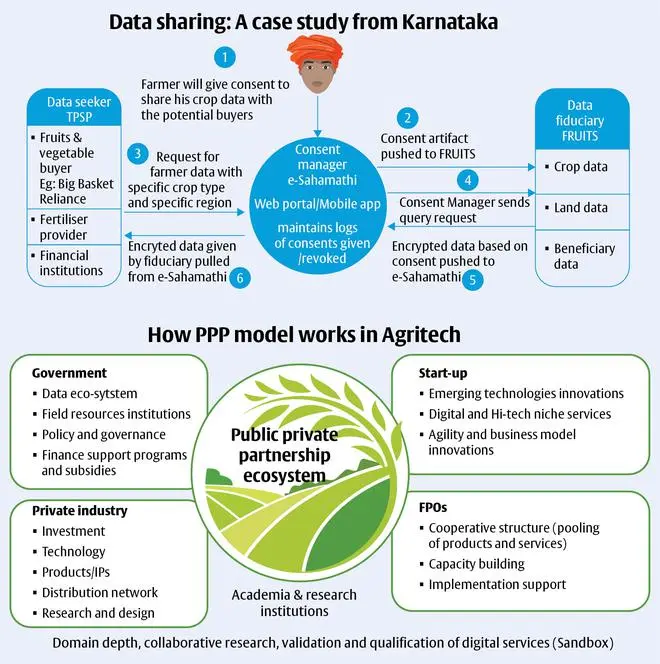
The government’s proposal to deliver hi-tech services to farmers through public private partnerships (PPPs), recently presented in its annual budget, is likely to offer critical support for the agricultural sector at a time when it is greatly needed.
The Covid pandemic and the war in Ukraine has massively disrupted the global food system, putting huge pressure on agriculture-focussed countries like India to provide more sustainable options.
This is where agricultural technology could prove vital. India has potential economic value of $50-65 billion through digital agriculture by 2025 translating to 23 per cent addition to the current value of agricultural produce, according to a report by the Ministry of Electronics and Information Technology and McKinsey & Company.

Such investment can also have a significant impact beyond the economy. With 60 per cent of India’s agricultural land being rain-fed, climate change poses a critical threat to food and agricultural systems.
So using agricultural technology and precision tools will be more important than ever to prevent hunger and eliminate food waste, and making these technologies more accessible to India's 130 million smallholder farmers can ensure greater financial resilience for them.
As new technologies present a major opportunity to transform agricultural systems, every stakeholder must play a role in realising this potential. This is where public private partnerships (PPPs) will be vital.
Four pillars
Fundamentally, there are four pillars needed for successful public private partnerships in agriculture and how they are already being applied in India:
Open up the data ecosystem. Why it's important: Through an extended discussion with 35-plus leading agricultural technology start-ups and some of the largest industry players, opening up critical datasets are the most important factor for unlocking the $65 billion digital agriculture economy. Farm level digital advisory services can enhance productivity by 15 per cent, but they need datasets of soil health, weather and farm sensors.
What's in development: The E-Sahamathi initiative of Karnataka enables the sharing of agriculture and horticulture data from its database of more than 7 million farmers with start-ups/service providers and Telangana is working towards establishing agriculture data exchange ADEx. Access to digital financing and insurance services for hugely underserved smallholding and women farmers needs data from digitised land records, crop-cutting experiments, satellite images, fertiliser consumption and crop history.

Share field resources and infrastructure Why it's important: India has 650 plus start-ups that offer agri-tech innovations in partnership with industries and financial institutions, but lack scale due to the very high costs of serving smallholding farmers and building their own distribution system.
What's in development: National and state governments have multiple institutions providing extension services to farmers like the CSC portal, a pan-India network of common service centres for extending e-gov and business services to rural areas through a single delivery platform;
Partnering with academic and research institutions Why it's important: While start-ups have good expertise of emerging technologies however they often lack the application-level domain expertise. Such digital innovations also need testing and validation for credibility among farmers and scaled field deployment. The existing body of agricultural research from universities and institutions can be better leveraged to scale work done by private agricultural technology players through PPPs. What's in development: Praveen Rao, Vice-Chancellor at Professor Jayashankar Telangana State Agricultural University, says: “We support more than 20 start-ups across AI, drones, IOT sensors etc through our Agri-Hub sandbox and our mission is to build a vibrant entrepreneurship culture among all the innovators, rural entrepreneurs and especially youth, women and farmers.”
Convergence of programmes and policies for agricultural technology services Why it's important: Government can help build a standardised platform for direct support and incentives to farmers and FPOs, which could specifically be leveraged for agricultural technology services.
Jinesh Shah, Managing Partner at Omnivore, a leading venture capital organization focused on agriculture, says: “Public private partnership for digital services in agriculture is an urgent requirement to help scale the agri start-up ecosystem and enable innovation to reach smallholding farmers."
The World Economic Forum has launched the AI4AI (AI for Agriculture Innovation) initiative and Food Innovation Hubs in collaboration with the Agriculture Ministry and multiple State governments with the intent of enabling and scaling PPPs for driving innovation across the agriculture ecosystem, establishing toolkits and frameworks through evidence based learning from pilots on ground.
Other States including Madhya Pradesh, Meghalaya and Karnataka have also been exploring various PPP approaches for hi-tech agriculture services. Madhya Pradesh has launched a Food Innovation Hub to explore PPP models for crop value chain transformation, while Meghalaya has been examining how to leverage technologies to transform the turmeric value chain.
Agricultural technology revolution needed
To realise the opportunity of emerging technologies for agriculture and food systems much change is needed. For instance, it will be critical to develop a flexible framework/handbook for defining a PPP approach through multi-stakeholder consultations, which can then be adopted by States to meet specific priorities.
Since the Budget announcement of hi-tech services for farmers through a PPP approach, there is a need of launching this initiative in mission mode. National and State governments can strengthen the dialogue with private stakeholder ecosystem and establish the PPP framework through consultations and evidence-based learning through pilots.
Overall, it is an excellent opportunity to revisit policy level support for innovation and for changing the landscape of agriculture.
Ranjan is Principal Secretary, Industries and Commerce, Government of Telangana, and and Kaushik is Head, Centre for the Fourth Industrial Revolution, World Economic Forum, India







Comments
Comments have to be in English, and in full sentences. They cannot be abusive or personal. Please abide by our community guidelines for posting your comments.
We have migrated to a new commenting platform. If you are already a registered user of TheHindu Businessline and logged in, you may continue to engage with our articles. If you do not have an account please register and login to post comments. Users can access their older comments by logging into their accounts on Vuukle.